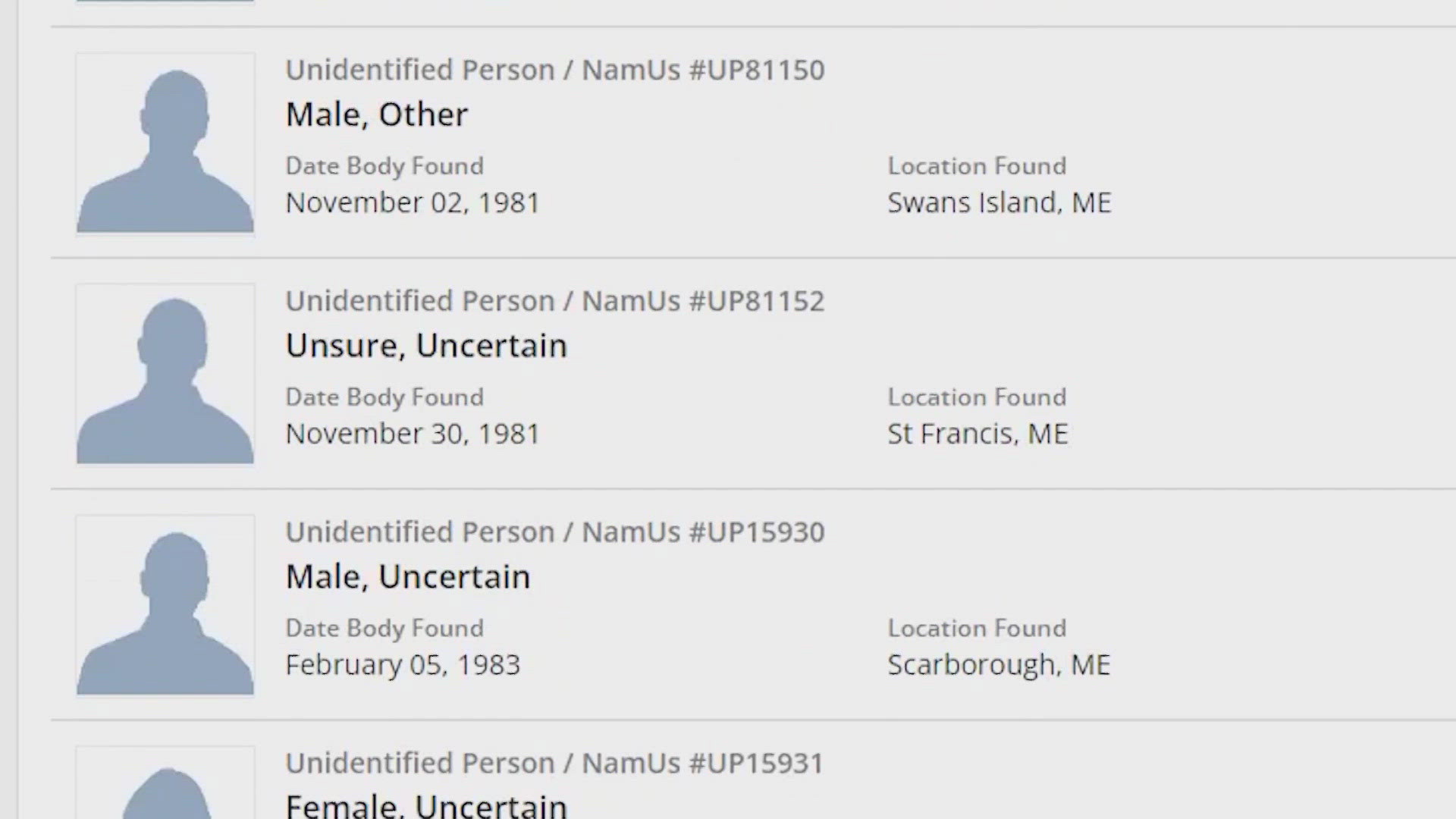AUGUSTA, Maine — Maine's Appropriations and Financial Affairs committee allocated $100,000 to a bill that would help identify more than 20 human remains whose cases have never been solved.
LD 838 requires the Chief Medical Examiner to use forensic genetic genealogy testing on the DNA of the human remains of an unidentified person after 45 days of having possession of the unidentified human remains.
Forensic genetic genealogy is the use of DNA analysis and traditional genealogy research to help law enforcement solve unsolved violent crimes.
Supporters include "Missing in ME," a non-profit organization that was founded in 2022 with the aim of advocating for missing persons and unidentified human remains. Jared Pinkham is one of the founders, who followed the case of Kimberly Moreau, a 17-year-old from Jay who went missing 38 years ago.
"I've seen Mr. Moreau put the fliers up on all the telephone poles. As I became older, realizing that, you know, he was kind of doing it alone with his family. And [I felt] there really needed to be a community effort," Pinkham said.
Pinkham and his local representative, Rep. David Boyer (R - Poland), wrote LD 838. Pinkham said he has developed relationships with families of unsolved cases, as well as the State Police and the Office of the Chief Medical Examiner. The OCME has 28 unidentified human remains, according to the National Missing and Unidentified Persons System, or NamUs, a government agency.
Pinkham said the money will allow the OCME to contract with Othram, a company that uses forensic genetic genealogy technology in conjunction with NamUs to identify human remains and resolve missing person cases.
"Old DNA technology back in the nineties, you'd have maybe tens of markers that would identify a person. This new DNA technology has thousands of markers that will identify this person. The probability of it being the person are basically 99.9%," Pinkham said. "It's a process that's going to take a little bit of time, but it's going to heal a lot of communities when we start bringing people home."
A spokesperson for the OCME wrote in a statement to NEWS CENTER Maine that staff are excited about the Legislature prioritizing the agency's work. The OCME has 12 staff serving the entire state of Maine.
"We have not been granted additional staff since 2014, and our budget has only increased slightly in the past decade. We must be critical with resource allocation, however, we have continued to work diligently to bring identifications back to individuals within the constraints of our available resources," spokesperson Lindsey Chasteen wrote. "This funding will allow the OCME to work with the larger private labs who specialize in generating DNA profiles from older remains, and who conduct forensic genetic genealogy. We’re hoping the Senate and Governor will agree that the work done by the OCME is important, and enact LD 838 and LD 610. We look forward to making substantial progress on Maine’s identifications and bringing people home to their families."
The Medical Examiner's Office is required to identify all human remains found in Maine. Chasteen said all remains have a DNA profile in CODIS, the Combined DNA Identification System, which is managed by the FBI.
"With the development of and ever-increasing number of identifications made using forensic genetic genealogy, the OCME is looking at options to use this resource," Chasteen wrote. "We must rely on the least expensive options, and those may have longer turnaround times. We’ve had prior success with [the] DNA Doe Project and Identifinders."
This technology has helped Maine investigators in the past.
In February 2019, Maine State Police helped Alaska State Police arrest Steven Downs, charged with the 1993 sexual assault and murder of a woman from Alaska, seemingly ending a 26-year cold case. Downs was living in Auburn at the time. His aunt submitted her own DNA to a genealogy service which allowed investigators to connect Downs to DNA found on Sergie's body in 2019. He was convicted of murdering Sophie Sergie in April 1993, but is appealing.
Chasteen said the OCME currently has five unidentified remains undergoing forensic genetic genealogy. Pinkham said the $100,000 will pay for Othram to start processing 20 of the remains right away, with another $15,000 expected for each year until the state has identified all the remains in its care.
"We're at the cusp of new DNA technology. We're at the cusp of forensic genetic genealogy and forensic genetic genealogy will allow us to locate this person's ancestors and their relatives and start there and, you know, make our way back to the person who's actually unidentified," Pinkham said. "Not only do these cold case families get our help, but the coroner's office needs our help, too. You know, we all need to work together to get this stuff funded."
While NamUs shows 28 unidentified human remains found in Maine, the State Police list 35 missing people and 72 unsolved homicides.
"We don't have 28 years to go ahead and do this one year at a time. We're losing generations of parents in our state, and it's very important that we really start getting answers if the technology's there. And it is," he said.

